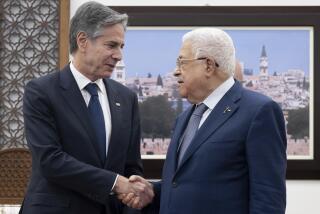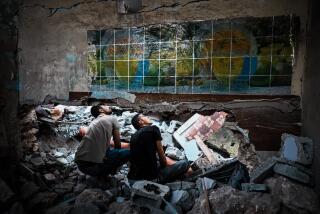Bremer Upbeat but Warns of More Attacks
- Share via
WASHINGTON — The top U.S. official in Iraq painted an upbeat picture of the nation’s reconstruction Sunday, even as he warned of continued attacks on American forces and acknowledged that Saddam Hussein was probably alive and still in the country.
In a series of appearances on the Sunday morning television news shows, L. Paul Bremer III, the veteran diplomat serving as the U.S. civilian administrator in Iraq, predicted that electric and water services could be restored to prewar levels within eight weeks, and that an elected Iraqi government could be in place by next year.
Bremer’s comments came on the same day that thousands of angry Iraqis in the Shiite holy city of Najaf marched on the headquarters of the U.S. commander demanding the removal of U.S. forces. The protesters were followers of Muqtader Sadr, an Iranian-backed cleric who since the end of the war has emerged as among the more strident of several leaders seeking the loyalty of Iraq’s Shiite majority.
Bremer acknowledged that the U.S. would probably be compelled to maintain a military presence in Iraq for a lengthy period. “I think it’s clear that, given the size of the task, we are going to be there for a while,” he said on NBC’s “Meet the Press.” “I don’t know how many years.”
Asked directly if he believed the U.S. would find weapons of mass destruction in Iraq, Bremer said that he believed coalition forces would find “evidence of the programs” to develop such weapons.
As Bremer spoke, prominent Democrats continued their sharp criticism of President Bush, both for his handling of prewar intelligence and his planning for the postwar reconstruction that Bremer now directs.
On “Meet the Press,” Sen. Joseph R. Biden Jr. (D-Del.), the ranking Democrat on the Senate Foreign Relations Committee, called on the Bush administration to place the reconstruction under authority of a new U.N. resolution. That, he argued, was the only way to convince other nations to send troops to Iraq, which he argued were needed to quell the resistance.
“We need 25,000 more troops now,” Biden said. “And it either means they’re going to be ours, ours alone, or we’re going to do it with other people. [If] you want to share the burden, you got to share some of the decisions too.”
Last week, U.S. officials indicated that they are considering such a resolution. That would mark a sharp turn in direction for Bush, who launched the war in Iraq without explicit U.N. authorization and has generally confined international organizations to a minor role in the reconstruction.
Today, the U.S. has about 147,000 troops on the ground in Iraq, while 19 other countries, primarily Britain, have contributed 13,000. “For the time being, all of the military forces are, and I think should remain, under American command,” Bremer said on “Fox News Sunday.”
Bremer said he did not believe that Hussein was personally directing the escalating attacks. But he told Fox that “there has been some evidence” that the Iraqi military may have planned before the war to launch a systematic guerrilla resistance once the conflict was over.
Bremer said he believed Hussein was alive and in Iraq, most likely in “the Sunni triangle” -- the area between Tikrit, Hussein’s hometown, where many of his loyalists are believed to operate, and Baghdad to the south.
“The sooner we can either kill him or capture him the better, because the fact that his fate is unknown certainly gives his supporters the chance to go around and try to rally support for him,” Bremer said on “Meet the Press.”
The forces behind Sunday’s protest in Najaf were not Hussein loyalists but Shiite hard- liners led by Sadr, who recently called for the creation of an Islamic army in Iraq. Sadr has gained a following because his father, Mohammed Sadeq Sadr, a revered ayatollah, was slain by Hussein’s agents in 1999.
Marchers said they staged the demonstration because U.S. forces had threatened Sadr’s headquarters in the southern city Saturday.
U.S. authorities insisted that the stepped-up security was only because of a visit to Najaf by Deputy Defense Secretary Paul D. Wolfowitz.
Standing before a line of foreign troops, a cleric spelled out demands, including the full and immediate withdrawal of American forces from Iraq, beginning with Najaf; the end in the city of coalition broadcasts, which he accused of being immoral; and an apology for the alleged surrounding of Sadr’s house by U.S. troops.
“I will not apologize for a thing which has not happened,” said Lt. Col. Chris Conlin of the 1st Marine Expeditionary Force, the commander of U.S. forces in Najaf. “What they are claiming is absolutely false and fabricated.”
Conlin said most of the people of Najaf are loyal to the elderly leader of the prestigious Hawza theological seminary, who has ordered his followers not to use violence against U.S. forces and who is taking a wait-and-see stance toward the occupation authority.
Wolfowitz, one of the war’s chief strategists, has spent the last few days in the country speaking about the future Iraqi government, the restoration of electricity and the human rights abuses of Hussein’s regime.
On Sunday afternoon, Wolfowitz walked through Baghdad’s notorious Abu Ghraib prison, where occupying authorities say 66 prisoners were once executed in a day.
Inside a sweltering courtyard at Abu Ghraib, about 500 Iraqi prisoners mingled as the U.S.-led Coalition Provisional Authority refurbished the looted cells inside to house them later.
Wolfowitz acknowledged that it was a painful decision to reopen the prison. “I had some concern with the mere idea of using Abu Ghraib with all it implies. It turns out it’s the only prison that was left standing after people tore down the others.... The horror of this place and the kinds of things that went on here, I think, can help you understand why the fear of Saddam Hussein hasn’t left this country.”
Times staff writers John Hendren and John Daniszewski in Baghdad and special correspondent Raheem Salman in Najaf contributed to this report.
--- UNPUBLISHED NOTE ---
In stories after April 9, 2004, Shiite cleric Muqtader Sadr is correctly referred to as Muqtada Sadr.
--- END NOTE ---
More to Read
Sign up for Essential California
The most important California stories and recommendations in your inbox every morning.
You may occasionally receive promotional content from the Los Angeles Times.













